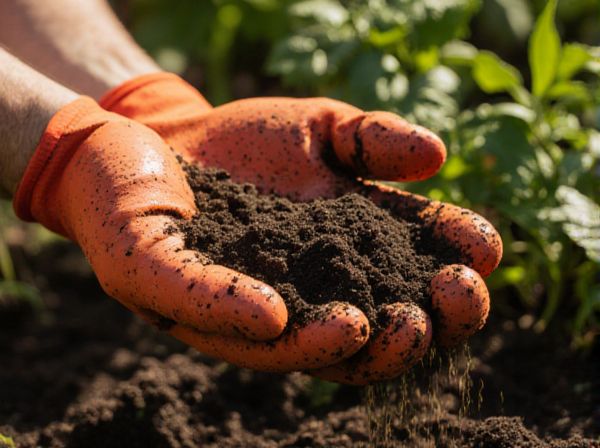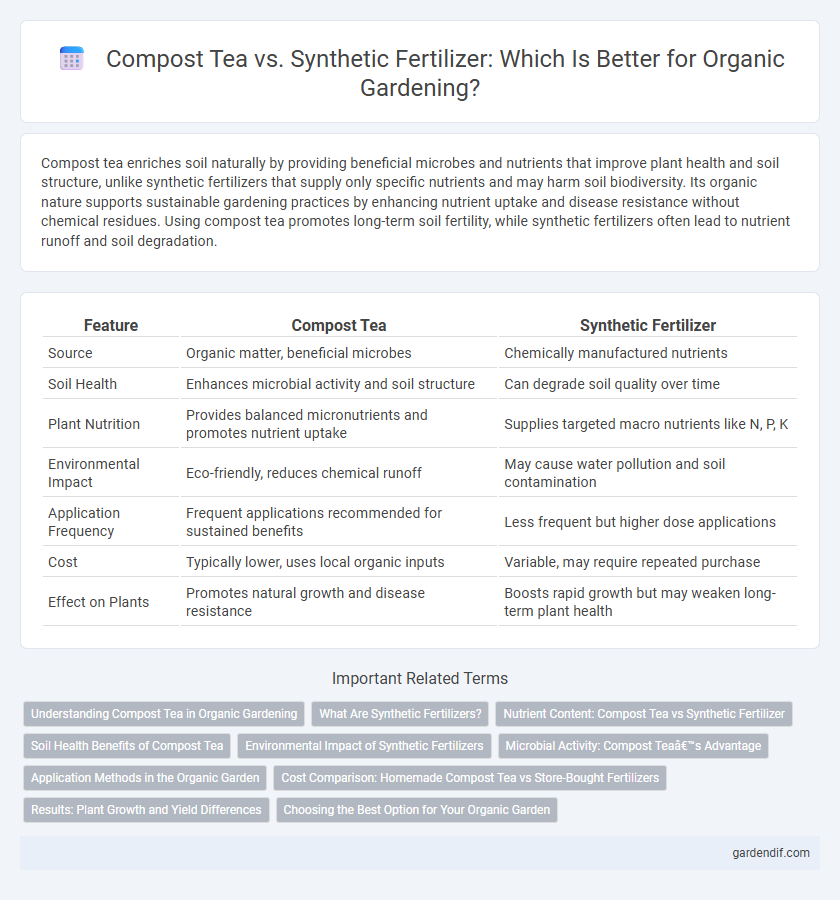
Compost tea vs synthetic fertilizer Illustration
Compost tea enriches soil naturally by providing beneficial microbes and nutrients that improve plant health and soil structure, unlike synthetic fertilizers that supply only specific nutrients and may harm soil biodiversity. Its organic nature supports sustainable gardening practices by enhancing nutrient uptake and disease resistance without chemical residues. Using compost tea promotes long-term soil fertility, while synthetic fertilizers often lead to nutrient runoff and soil degradation.
Table of Comparison
| Feature | Compost Tea | Synthetic Fertilizer |
|---|---|---|
| Source | Organic matter, beneficial microbes | Chemically manufactured nutrients |
| Soil Health | Enhances microbial activity and soil structure | Can degrade soil quality over time |
| Plant Nutrition | Provides balanced micronutrients and promotes nutrient uptake | Supplies targeted macro nutrients like N, P, K |
| Environmental Impact | Eco-friendly, reduces chemical runoff | May cause water pollution and soil contamination |
| Application Frequency | Frequent applications recommended for sustained benefits | Less frequent but higher dose applications |
| Cost | Typically lower, uses local organic inputs | Variable, may require repeated purchase |
| Effect on Plants | Promotes natural growth and disease resistance | Boosts rapid growth but may weaken long-term plant health |
Understanding Compost Tea in Organic Gardening
Compost tea enhances soil fertility in organic gardening by introducing beneficial microorganisms that improve nutrient availability and plant health. Unlike synthetic fertilizers that supply nutrients directly, compost tea promotes a balanced ecosystem, supporting long-term soil vitality and reducing chemical dependency. This natural brew enriches soil microbiomes, leading to healthier plants and sustainable growth.
What Are Synthetic Fertilizers?
Synthetic fertilizers are chemically manufactured substances designed to supply essential nutrients like nitrogen, phosphorus, and potassium directly to plants for rapid growth. These fertilizers often contain concentrated, water-soluble compounds that can increase nutrient availability quickly but may disrupt soil microbial activity and degrade organic matter over time. Unlike compost tea, which enhances soil health by promoting beneficial microorganisms, synthetic fertilizers primarily focus on nutrient supplementation without improving soil structure or biodiversity.
Nutrient Content: Compost Tea vs Synthetic Fertilizer
Compost tea contains a diverse array of nutrients, including nitrogen, phosphorus, potassium, and beneficial microbes that enhance soil fertility and plant health naturally. Synthetic fertilizers deliver concentrated and easily accessible nutrients with specific ratios, such as N-P-K formulations, but lack the microbial diversity found in compost tea. The gradual nutrient release from compost tea supports sustained plant growth, while synthetic fertilizers provide immediate nutrient availability but may risk soil nutrient imbalance over time.
Soil Health Benefits of Compost Tea
Compost tea enhances soil health by introducing diverse beneficial microorganisms that improve nutrient cycling and increase soil microbial activity, unlike synthetic fertilizers that primarily supply nutrients without boosting microbial life. Its use promotes soil structure, aeration, and water retention, leading to stronger root development and healthier plants. Regular application of compost tea reduces soil-borne diseases and supports long-term soil fertility through natural organic matter enrichment.
Environmental Impact of Synthetic Fertilizers
Synthetic fertilizers contribute significantly to environmental degradation through nutrient runoff, which leads to water pollution and harmful algal blooms. Their production relies heavily on fossil fuels, resulting in high carbon emissions that exacerbate climate change. In contrast, compost tea promotes soil health and reduces environmental risks by enhancing microbial activity without toxic residues.
Microbial Activity: Compost Tea’s Advantage
Compost tea significantly boosts soil health by enhancing microbial activity, fostering a diverse ecosystem of beneficial bacteria and fungi that improve nutrient availability and plant resilience. Synthetic fertilizers often lack this microbial stimulation, leading to diminished soil biology and potential long-term soil degradation. The robust microbial populations promoted by compost tea support natural nutrient cycling, disease suppression, and improved soil structure, offering a sustainable advantage over chemical inputs.
Application Methods in the Organic Garden
Compost tea is applied through foliar sprays and soil drenches, enhancing microbial activity and nutrient uptake in organic gardens. Synthetic fertilizers typically rely on direct soil incorporation or granular application, offering immediate nutrient availability but lacking benefits to soil biology. Organic gardeners prefer compost tea for its ability to improve soil structure and promote long-term plant health through microbial inoculation.
Cost Comparison: Homemade Compost Tea vs Store-Bought Fertilizers
Homemade compost tea offers a cost-effective alternative to store-bought synthetic fertilizers by utilizing readily available organic waste such as kitchen scraps and garden clippings, significantly reducing material expenses. While synthetic fertilizers require consistent purchases, compost tea can be produced in large quantities at minimal cost, enhancing soil health and microbial activity without harmful chemicals. This sustainable approach lowers long-term gardening costs and promotes eco-friendly nutrient cycling in comparison to the expense and environmental impact of synthetic options.
Results: Plant Growth and Yield Differences
Compost tea enriches soil microbiology, promoting healthier root systems and significantly enhancing plant growth and yield compared to synthetic fertilizers. Synthetic fertilizers often provide immediate nutrient supply but can lead to long-term soil degradation and reduced microbial diversity. Studies reveal that plants treated with compost tea exhibit increased nutrient uptake efficiency, resulting in higher-quality produce and sustainable productivity.
Choosing the Best Option for Your Organic Garden
Compost tea enriches soil with beneficial microbes and nutrients, enhancing plant health and promoting sustainable growth in organic gardens. Synthetic fertilizers provide immediate nutrient availability but may disrupt soil microbial balance and contribute to environmental pollution. Choosing compost tea supports long-term soil vitality and aligns with organic gardening principles for healthier, more resilient plants.
Compost tea vs synthetic fertilizer Infographic

 gardendif.com
gardendif.com